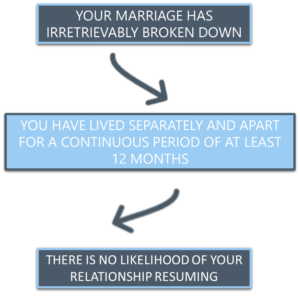
“Hi, I am calling about a Divorce”.
This is the most common statement that we hear from new family law enquiries.
But, did you know that applying for Divorce is actually one of the last steps to be taken in a family law matter? In fact, there are a number of legal matters that a separated couple should complete before applying for a Divorce, with the main one usually being to enter into Consent Orders. Please refer to our earlier post “We don’t Need To Involve Lawyers… Do We” for more information about Consent Orders.
This post provides some guidance about how to apply for Divorce, and when legal assistance may be required.
What the law Requires
In Australia, we have a no-fault Divorce system. This means that the reasons why you have separated do not matter. So, to apply for Divorce, you only need to meet the following 3 legal requirements:

What happens if we unsuccessfully tried to get back together?
If you and your spouse did try to get back together (i.e. resumed living together as a couple in lawyer terminology) but within 3 months you again separated, then the period of separation before and after the reconciliation can be added together as if they were one continuous period of separation.
What about if we have separated but continued to live in the same house?
This is a common scenario that we see all the time. You can still apply for a Divorce in this situation, but you need to provide proof to the Court that you were in fact separated rather than going through a rough patch in your marriage.
This will often require an:
– Affidavit (statement of evidence) by yourself and/or your spouse, and
– an additional Affidavit by a friend or neighbour,
providing facts to support your claim that you were not in a relationship during this time.
Can I apply for Divorce myself?
Yes, you can apply for a Divorce without the assistance of a legal professional.
There are two ways to apply for a Divorce:
- Together with your spouse – a Joint Application; or
- On your own – a Sole Application.
If you and your spouse are amicable and are making a Joint Application, the procedure is relatively straightforward and is often something that we suggest you can complete without a lawyer.
However, we recommend that you seek legal assistance in these 3 situations:
- If you are making a Sole Application. This is because you are required to serve your spouse with the Application (and additional documents), and certain rules and time limits apply.
- If you have been married for less than 2 years (see below).
- If you have separated but have lived in the same house, as highlighted above.
What information do I need for the Application?
Marriage Certificate
You will need to file a copy of your Marriage Certificate with your Application. If you do not have your Marriage Certificate, you can apply to the Registry of Births, Deaths, Marriages and Divorces (or State equivalent) for your Marriage Certificate.
Married for less than 2 years
If you have been married for less than 2 years, you and your spouse are required to file a Certificate with your Application stating that you have considered reconciliation using the assistance of a professional (e.g. family counsellor). In special circumstances, the Court may allow an Application to be filed without a Certificate.
If this applies to your situation, we recommend that you seek legal assistance.
Children under 18
In your Application, you are required to detail the care arrangements that have been made for your children who are under the age of 18. The Court will need to be satisfied that adequate arrangements have been made for the care, welfare and development of your children (i.e. proper housing, supervision and education).
How Do I File the Application with the Court?
You can file your Application for Divorce online using the Court’s e-Portal. Once you have registered your details, you can complete the Application through the Portal.
Do I need to serve my spouse with the filed Application?
You will only need to serve a Sole Application on your spouse. There is no need to with a Joint Application because both you and your spouse will have signed and agreed to making that Application.
Do I need to attend the Court Hearing?
The Court Hearing will generally be about 2 to 3 months after you file the Application.
You do not need to attend the Hearing if:
– You and your spouse have made a Joint Application; or
– There are no children under 18 (even if you have made a Sole Application).
You must attend the Court Hearing if:
– You have made a Sole Application and you have children under the age of 18.
What happens after the Hearing?
If your Divorce is granted, approximately 1 month after the Hearing, your Divorce Order (piece of paper stating that you and your spouse are no longer legally married) will be made available on the Portal. As strange as it sounds, the Court no longer provides hard copies of Divorce Orders, and this electronic document is all you will receive.
How does Divorce affect my property settlement?
After your Divorce has been granted, you have 12 months from the date of the Order to make an Application to the Court for a property settlement or spousal maintenance. To ensure that this time limit does not become an issue, we always recommend that you finalise your property settlement before you apply for Divorce.
How does Divorce affect my Will?
A Divorce Order will automatically cancel any part of your Will that includes your former spouse, subject to some exceptions. Please see our post “How Does Marriage, Separation And Divorce Affect Your Will?”.
Takeaway Point
Applying for a Divorce is often something that people can complete themselves, however the assistance of a legal professional can make the process run smoothly and efficiently.
Ready to Discuss?
Ready to discuss your options? Reach out to us today for a free consult, and let’s embark on this journey together. Martens Legal: Here for your family, your business, and your future.
By Tegan Martens
Director & Principal Lawyer
Martens Legal
DISCLAIMER:
The information contained on this site is for general guidance only. No person should act or refrain from acting on the basis of such information. You should seek appropriate professional advice based upon your particular circumstances.



